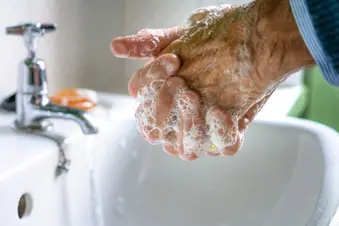
As you age, changes in your immune system make it harder to fight off disease and infection. So it’s best to limit your exposure to germs.
When you go to the doctor’s office, you risk picking up germs and getting sick. Doctors’ offices, hospitals, and other health care settings have a high risk of exposure to bacteria and viruses like colds, the flu, and Covid.
Germs can spread through direct or indirect contact with health care workers or other patients. If someone who’s sick sneezes, coughs, or talks close to you, you may get sick too.
You can also pick up germs from touching magazines, doorknobs, elevator buttons, and medical equipment. If you touch a germ-infected surface and then touch your face, bacteria or viruses can enter your body through your nose, eyes, and mouth.
Take these steps to lower your risk.
Wash Your Hands
Experts say the best way to stop germs from making you sick is to wash your hands properly. Here’s how:
- Wet your hands with running water.
- Lather your hands with soap.
- Rub them together for 20 seconds or longer.
- Be sure to get the backs of your hands, your wrists, between your fingers, and under your nails.
- Rinse your hands well under running water.
- Turn the water off with your elbow.
- Use a clean towel to dry your hands, or let them air dry.
If you don’t have access to a sink and soap, use hand sanitizer. Make sure it has at least 70% alcohol.
After your doctor visit, wash your hands well.
Don’t Touch Your Face
Viruses and bacteria get into your body when they pass through mucous membranes in your eyes, nose, or mouth. If you touch something at your doctor’s office and then touch your face, you may get sick.
Try to keep your hands away from your face. Most of us touch our faces 23 or more times every hour. It may be a challenge at first. But it can stop germs from spreading.
Be Careful in Waiting Rooms
Practice social distancing. Keep a 6-foot distance from everyone in the waiting room.
If the waiting room is small or crowded, wait somewhere else, like in the hall, outside, or in your car. Ask the office staff to call you when your doctor is ready.
Wear a Face Mask
Wear a respirator-type mask such as a KN95 or a snug cloth face covering. The doctor’s office or hospital may turn you away if you don’t. Make sure it fits snugly around your ears and covers your nose and mouth. Wash it when you get home, and after every use.
Try Smart Scheduling
Ask the staff at your doctor’s office what they’re doing about social distancing. Know that waiting rooms are usually cleanest early in the day. Try to make your appointment first thing in the morning. You can also try later in the day, when fewer people are in the office.
For routine exams, tests, and flu shots, make your appointments in spring or summer, when there are fewer illnesses going around.
Get a Head Start
Get your flu shot every year. A flu shot can prevent you from getting sick. And if you do get exposed to germs at the doctor’s office, the vaccination can lessen your symptoms and cut back on how long you’re ill.
Try Telemedicine
More and more, doctors and health care providers are offering telemedicine. Instead of going into the office, you can talk to your doctor over video, telephone, or email.
Telemedicine cuts your risk of being exposed to germs. It’s also convenient and can help you stay independent, especially if you live in a remote location.
Get Prescriptions by Mail
Germs abound in the drugstore, too. If you get a prescription at your doctor visit, instead of making a trip to your local pharmacy, have them deliver your meds or try a mail-order pharmacy. Your prescriptions will come straight to your home so you don’t need to go out. You can also call or go online to ask questions or get drug information.
Show Sources
Photo Credit: iStock / Getty Images Plus / Getty Images
SOURCES:
National Council on Aging: “Updated: Coronavirus: What Older Adults Need to Know.”
Collins, A. Patient Safety and Quality: An Evidence-Based Handbook for Nurses, Agency for Healthcare Research and Quality, 2008.
Cleveland Clinic: “Hand Washing.”
CDC: “Use of Cloth Face Coverings to Help Slow the Spread of COVID-19.”
Paediatrics & Child Health: “Avoiding infection: What to do at the doctor’s office.”
Scripps: “How to Avoid Getting Sick at the Doctor’s Office.”
Johns Hopkins Medicine: “Coronavirus and COVID-19: Caregiving for the Elderly.”
Smart Homecare Technology and TeleHealth: “Use of telemedicine-based care for the aging and elderly: promises and pitfalls.”
Integrated Pharmacy Research and Practice: “Telepharmacy: a pharmacist’s perspective on the clinical benefits and challenges.”